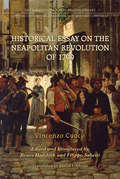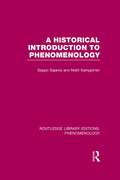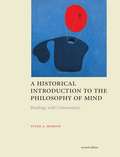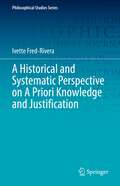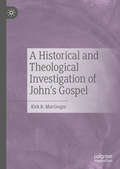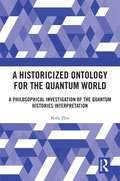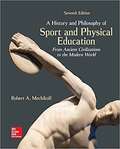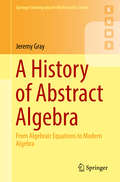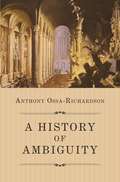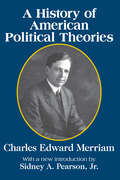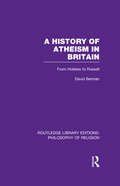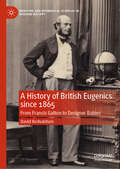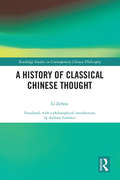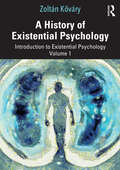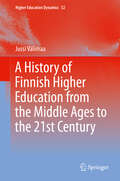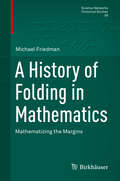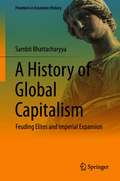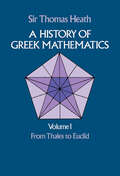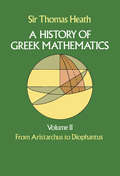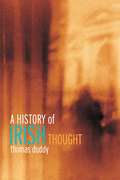- Table View
- List View
A Historical Essay on the Neapolitan Revolution of 1799
by Bruce Haddock David Gibbons Vincenzo Cuoco Filippo SabettiDeeply influenced by Enlightenment writers from Naples and France, Vincenzo Cuoco (1770-1823) was forced into exile for his involvement in the failed Neapolitan revolution of 1799. Living in Milan, he wrote what became one of the nineteenth century's most important treatises on political revolution.In his Historical Essay on the Neapolitan Revolution of 1799, Cuoco synthesized the work of Machiavelli, Vico, and Enlightenment philosophers to offer an explanation for why and how revolutions succeed or fail. A major influence on political thought during the unification of Italy, the Historical Essay was also an inspiration to twentieth-century thinkers such as Benedetto Croce and Antonio Gramsci.This critical edition, featuring an authoritative translation, introduction, and annotations, finally makes Cuoco's work fully accessible to an English-speaking audience.
A Historical Introduction to Phenomenology (Routledge Library Editions: Phenomenology)
by Matti Kamppinen Seppo SajamaThis book offers a concise exposition of the content theory of intentionality, which lies at the root of Husserl’s phenomenology, for student and scholar. Originally published in 1982. The first part traces the history of phenomenology from its beginnings in Aristotle and Aquinas through Hume, Reid and the Brentano school to its first clear formulation in Frege and Husserl. Part two analyses some special problems involved in two important types of mental phenomena – perception and emotion – without abandoning the historical approach. Husserl’s theory of perception is extensively discussed and a Husserlian analysis of so-called de re acts is attempted.
A Historical Introduction to the Philosophy of Mind: Readings with Commentary (2nd edition)
by Peter Alan MortonThe issues introduced in this book are today referred to collectively as "the mind-body problem." The simplest way to describe this problem is to say that it is a search for an answer to the question, 'What is the relationship between the mind and the physical body?' This search raises such issues as whether the mind and body are one thing or two, and whether artificial machines could have minds.
A Historical and Legal Comparison between Tianxia Wei Gong and Quod Omnes Tangit (Ius Gentium: Comparative Perspectives on Law and Justice #110)
by Yifan ShangThis book explores the historical and legal importance of two principles, Quod Omnes Tangit, and Tianxia Wei Gong, which have played significant roles in European and Chinese political and legal history. While Quod Omnes Tangit has been thoroughly researched, Tianxia Wei Gong has not been systematically examined. This thesis fills this void and connects these two principles for the first time. Quod Omnes Tangit was initially introduced in Justinian's Codex Civil, while Tianxia Wei Gong originated from Liji, one of the books in a key series of works by Confucius. Liji is comparable to the Thora in the Old Testament and is considered as important as law in Chinese legal history. Both principles have undergone comparable developmental processes, with scholars contributing to their reinterpretation. This book thoroughly examines the interpretations of individual scholars, with particular attention given to Liang Qichao, who is the only one to have mentioned both Tianxia Wei Gong and Quod Omnes Tangit. The book also provides an explanation for the original discrepancies in their concepts, particularly their methodologies in distributing and legitimizing rights. This research will be of interest to legal philosophers and historians in both the Western and Eastern worlds, legal practitioners and policymakers, and researchers seeking to explain current events and explore fundamental differences between the East and West.
A Historical and Systematic Perspective on A Priori Knowledge and Justification (Philosophical Studies Series #151)
by Ivette Fred-RiveraThis book provides a detailed and comprehensive account of the problem of a priori knowledge from a historical as well as a systematic perspective. The author explores Kant’s views in connection with the possibility of revision, something hardly, if at all, done in philosophical literature. Furthermore, the views of well-renowned philosophers such as Quine, Putnam, Kitcher, and Hale are discussed in detail and are put into a historical and systematic perspective. Finally, this book contains a glossary of important notions offering illuminating accounts of a priori knowledge and related notions and explains the relationship between a priori knowledge, fallibility and revision. The detailing of concepts such as ‘defeasibility’, ‘infallibility’, ‘falsifiability’ helps anyone reading philosophical literature to pin down the meaning of the terms and its implications in this context. The enriched and dual approach the author takes makes the book a very useful and lucid guide to the problem of a priori knowledge.
A Historical and Theological Investigation of John's Gospel
by Kirk R. MacGregorThis book provides original and controversial contributions into specific areas of Johannine studies, along with defenses of various traditional theological interpretations of John that are commonly overlooked in New Testament scholarship. Kirk R. MacGregor offers new insights into the authorship of the Fourth Gospel, the content of the underlying Signs Source, the meaning of the phrases “believe in him” and “believe in his name,” Jesus’ claim that Abraham saw his day, the significance of John 14.6, and why the resurrected Jesus upbraided Thomas. MacGregor employs the doctrine of middle knowledge to reconcile the seemingly paradoxical Johannine claims of divine predestination, genuine human freedom, and the universal divine salvific will. He defends the ontological equality but functional subordination of the Johannine Jesus to God the Father as well as the deity and personality of the Holy Spirit as presented by the Gospel of John.
A Historicized Ontology for the Quantum World: A Philosophical Investigation of the Quantum Histories Interpretation
by Kefu ZhuThis book discusses the ontology in the quantum world and argues that it should be interpreted as a historicized ontology. This perspective is advocated by the quantum histories interpretation.Inspired by the nomological interpretation from Bohmian mechanics and the corresponding understanding of the law of nature and logic, the ontology will be useful to solve the difficulties of confusing ontology and perplexing logical inference. Furthermore, this book proposes that the historicized ontology can be generalized to more complicated structures and fit naturally into temporal correlation. Core philosophical issues such as the law of nature, the ontology of events, history, and processes, and the metaphysics of history are coherently discussed, revealing the profound meaning behind the formalism of quantum histories. By providing a new framework for a historicized picture of ontology, it will effectively promote the debates in the philosophy of physics and the fundamental research in quantum mechanics.This book will appeal to scholars and students of the philosophy of science, metaphysics, and quantum theory.
A History and Philosophy of Sport and Physical Education: From Ancient Civilizations to the Modern World
by Robert MechikoffA History and Philosophy of Sport and Physical Education - From Ancient Civilizations to the Modern World, has been meaningfully written to engage readers with essential information and critical introspection that is meant to inspire and educate. This edition highlights salient individuals, movements, beliefs, and events that have impacted the long and storied historical and philosophical development of sport, physical education, and kinesiology. Robert Mechikoff offers students a layered and scholarly look into the sports and physical activities of the world - ranging from Ancient Egypt, Greece, and Rome to the emergence of the professional and academic disciplines of physical education and kinesiology in the modern world, as well as the political and social modern realities of the Olympic Games.
A History of Abstract Algebra: From Algebraic Equations to Modern Algebra (Springer Undergraduate Mathematics Series)
by Jeremy GrayThis textbook provides an accessible account of the history of abstract algebra, tracing a range of topics in modern algebra and number theory back to their modest presence in the seventeenth and eighteenth centuries, and exploring the impact of ideas on the development of the subject. Beginning with Gauss’s theory of numbers and Galois’s ideas, the book progresses to Dedekind and Kronecker, Jordan and Klein, Steinitz, Hilbert, and Emmy Noether. Approaching mathematical topics from a historical perspective, the author explores quadratic forms, quadratic reciprocity, Fermat’s Last Theorem, cyclotomy, quintic equations, Galois theory, commutative rings, abstract fields, ideal theory, invariant theory, and group theory. Readers will learn what Galois accomplished, how difficult the proofs of his theorems were, and how important Camille Jordan and Felix Klein were in the eventual acceptance of Galois’s approach to the solution of equations. The book also describes the relationship between Kummer’s ideal numbers and Dedekind’s ideals, and discusses why Dedekind felt his solution to the divisor problem was better than Kummer’s. Designed for a course in the history of modern algebra, this book is aimed at undergraduate students with an introductory background in algebra but will also appeal to researchers with a general interest in the topic. With exercises at the end of each chapter and appendices providing material difficult to find elsewhere, this book is self-contained and therefore suitable for self-study.
A History of Ambiguity
by Anthony Ossa-RichardsonEver since it was first published in 1930, William Empson’s Seven Types of Ambiguity has been perceived as a milestone in literary criticism—far from being an impediment to communication, ambiguity now seemed an index of poetic richness and expressive power. Little, however, has been written on the broader trajectory of Western thought about ambiguity before Empson; as a result, the nature of his innovation has been poorly understood.A History of Ambiguity remedies this omission. Starting with classical grammar and rhetoric, and moving on to moral theology, law, biblical exegesis, German philosophy, and literary criticism, Anthony Ossa-Richardson explores the many ways in which readers and theorists posited, denied, conceptualised, and argued over the existence of multiple meanings in texts between antiquity and the twentieth century. This process took on a variety of interconnected forms, from the Renaissance delight in the ‘elegance’ of ambiguities in Horace, through the extraordinary Catholic claim that Scripture could contain multiple literal—and not just allegorical—senses, to the theory of dramatic irony developed in the nineteenth century, a theory intertwined with discoveries of the double meanings in Greek tragedy. Such narratives are not merely of antiquarian interest: rather, they provide an insight into the foundations of modern criticism, revealing deep resonances between acts of interpretation in disparate eras and contexts. A History of Ambiguity lays bare the long tradition of efforts to liberate language, and even a poet’s intention, from the strictures of a single meaning.
A History of American Political Theories
by Charles MerriamA History of American Political Theories is a comprehensive attempt to understand the full sweep of American political thought since the founding. Working within the liberal-progressive tradition, Merriam reviewed American political history in its entirety, from the founding down to his own day. He was not out to reduce political thought to a single element such as economics alone; his aim was to encompass the whole of modern social science.The political science of the liberal-progressive tradition has roots and assumptions that were born in this period and nurtured by scholars such as Merriam. The progressive tradition in general and Merriam in particular interpreted the rise of a new science of politics that would be required for the liberal-progressive world view he represented. His work stands at a momentous fork in the road; two great traditions of how American democracy should be understood, interpreted, and analyzed parted company and afterward each went their separate ways. These traditions are represented, respectively, by the founders and the liberal-progressives. There was much at stake in these academic debates, though the consequences were not entirely foreseen at the time.An overview of the authors, works, and general source material covered in History of American Political Theories is impressive. Merriam viewed the study of American democracy as an eclectic activity embracing the broadest definition of the social sciences, with particular emphasis on psychology. Such a transformation required that the social sciences be grouped as a whole rather than fragmented into separate and distinct academic departments.
A History of Atheism in Britain: From Hobbes to Russell (Routledge Library Editions: Philosophy of Religion)
by David BermanProbably no doctrine has excited as much horror and abuse as atheism. This first history of British atheism, first published in 1987, tries to explain this reaction while exhibiting the development of atheism from Hobbes to Russell. Although avowed atheism appeared surprisingly late – 1782 in Britain – there were covert atheists in the middle seventeenth century. By tracing its development from so early a date, Dr Berman gives an account of an important and fascinating strand of intellectual history.
A History of Balance, 1250-1375
by Joel KayeThe ideal of balance and its association with what is ordered, just, and healthful remained unchanged throughout the medieval period. The central place allotted to balance in the workings of nature and society also remained unchanged. What changed within the culture of scholasticism, between approximately 1280 and 1360, was the emergence of a greatly expanded sense of what balance is and can be. In this groundbreaking history of balance, Joel Kaye reveals that this new sense of balance and its potentialities became the basis of a new model of equilibrium, shaped and shared by the most acute and innovative thinkers of the period. Through a focus on four disciplines - scholastic economic thought, political thought, medical thought, and natural philosophy - Kaye's book reveals that this new model of equilibrium opened up striking new vistas of imaginative and speculative possibility, making possible a profound re-thinking of the world and its workings.
A History of British Eugenics since 1865: From Francis Galton to Designer Babies (Medicine and Biomedical Sciences in Modern History)
by David RedvaldsenThis book examines British eugenics from its origins in 1865 to the early 1990s. It considers the two institutions promoting the doctrine: the Galton Laboratory attached to the University of London; and the Eugenics Society. It charts internal and ideological changes across more than a century, seeing eugenics as primarily a political movement. The doctrine had influence on British society and guided adherents ranging from scientists to charitable ladies. The Galton Laboratory published detailed studies of heredity. It transformed itself into a centre for medical genetics after the Second World War. As early as the 1920s, the Eugenics Society was the mainspring of the doctrine, formulating what became the British version of an international ideology. It began as applied social Darwinism, later incorporating a greater degree of meritocracy and amelioration. Its support for sterilization in the 1930s eroded the kudos it had gained in policy-making circles. From the 1960s, organized eugenics was especially a forum for learned and popular discussion of biology and sociology. Medical advances after 1970 aided its continuation, notably the growth of assisted reproductive technologies. The book presents British eugenics as mostly shaped by domestic concerns, offering new revelations and interpretations with the capacity to readjust historical thinking. It also covers contemporary bioethical and political issues aligned to eugenics.
A History of China in the 20th Century
by Lü PengThis book provides readers with rich context and detailed description leading to new perspectives on major historical events in China. Positioned as a thought leader and highly acclaimed arts professional in China, the author is able to give a historical account of China’s twentieth century that is richly informed by its valent fields of political economy and cultural studies. Western readers' knowledge of China’s twentieth century remains based on pioneering research of modern scholars such as Fairbank and Jonathan Spence. In recent years, however, it is rare to see a complete history of China spanning the nineteenth and twentieth centuries which also includes the first two decades of the twenty-first century. This book contributes new narrative and perspective to this span of history. Now, as the Sino-US trade conflict makes dramatic impact on a post-COVID global economy, readers have the need for a fresh understanding of how China came to be what it is today. The author’s groundbreaking work provides new insight provided by newly uncovered sources explaining how China came to be what it is today from a cultural and sociological perspective, in a historical mode.
A History of China-U.S. Relations (Contributions to International Relations)
by Wenzhao TaoThis book contains the history of China-U.S. Relations (1911–1949), including China-US relations in Early Republican Period, the impact of Versailles Peace Conference and Washington Conference on China-US relations, US support for Northern Warlord Government, the Guangzhou Revolutionary Government, and the Nanjing National Government. During the War of Resistance Against Japanese Aggression, the United States went from neutral to form an alliance with China against Japan. After the end of the War, China and the United States gradually moved toward confrontation. This book also has a brief description of China-US relations from 1784 to 1911.
A History of Classical Chinese Thought (Routledge Studies in Contemporary Chinese Philosophy)
by Zehou LiLi Zehou is widely regarded as one of China’s most influential contemporary thinkers. He has produced influential theories of the development of Chinese thought and the place of aesthetics in Chinese ethics and value theory. This book is the first English-language translation of Li Zehou’s work on classical Chinese thought. It includes chapters on the classical Chinese thinkers, including Confucius, Mozi, Laozi, Sunzi, Xunzi and Zhuangzi, and also on later eras and thinkers such as Dong Zhongshu in the Han Dynasty and the Song-Ming Neo-Confucians. The essays in this book not only discuss these historical figures and their ideas, but also consider their historical significance, and how key themes from these early schools reappeared in and shaped later periods and thinkers. Taken together, they highlight the breadth of Li Zehou’s scholarship and his syncretic approach—his explanations of prominent thinkers and key periods in Chinese intellectual history blend ideas from both the Chinese and Western canons, while also drawing on contemporary thinkers in both traditions. The book also includes an introduction written by the translator that helpfully explains the significance of Li Zehou’s work and its prospects for fostering cross-cultural dialogue with Western philosophy. A History of Chinese Classical Thought will be of interest to advanced students and scholars interested in Chinese philosophy, comparative philosophy, and Chinese intellectual and social history.
A History of Existential Psychology: Introduction to Existential Psychology Volume 1
by Zoltán KőváryThe first in a two-part set, this book takes a deep dive into the history and theory of existential psychology.Beginning with a discussion of the “existentialism and psychology problem,” the book presents the philosophical and historical roots of existential psychology. It introduces the most important philosophical schools in the development of existentialism and their creators, such as Kierkegaard, Nietzsche, Heidegger and Sartre, as well as the literary roots of existentialism in the writings of Dostoevsky and Kafka and the important contribution of psychoanalysis and phenomenological psychiatry. The book then goes on to look at the existential psychology schools, including daseinsanalysis, logotherapy and existential analysis, the existential-humanistic school and the existential-phenomenological school.Going beyond the questions of therapy and counseling that typically make up the study of existential psychology, the book offers the ultimate introduction for students and scholars of this fascinating and deeply rooted discipline. It may also interest professionals working in related fields.
A History of Finnish Higher Education from the Middle Ages to the 21st Century (Higher Education Dynamics #52)
by Jussi VälimaaThis book unravels the origins, continuities, and discontinuities of Finnish higher education as part of European higher education from the Middle Ages to the 21st century. It describes the emergence of universities in the Middle Ages and the Finnish student, and moves on to the Reformation and the end of Swedish rule. It then discusses the founding of the Royal Academy of Turku, its professors and governing bodies, its role as a community, student numbers, the research and controversies. Travelling through the age of autonomy, the first decades of independence and the Second World War, the book examines the expansion of higher education, the development of the system, and the establishment of polytechnics. It concludes by analysing the multiple institutional and organisational layers of Finnish higher education. Altogether, the book offers an historical study that shows how and why education and higher education have been important in the process of making the Finnish nation and nation state.
A History of Folding in Mathematics: Mathematizing The Margins (Science Networks. Historical Studies #59)
by Michael FriedmanWhile it is well known that the Delian problems are impossible to solve with a straightedge and compass – for example, it is impossible to construct a segment whose length is the cube root of 2 with these instruments – the discovery of the Italian mathematician Margherita Beloch Piazzolla in 1934 that one can in fact construct a segment of length the cube root of 2 with a single paper fold was completely ignored (till the end of the 1980s). This comes as no surprise, since with few exceptions paper folding was seldom considered as a mathematical practice, let alone as a mathematical procedure of inference or proof that could prompt novel mathematical discoveries. A few questions immediately arise: Why did paper folding become a non-instrument? What caused the marginalisation of this technique? And how was the mathematical knowledge, which was nevertheless transmitted and prompted by paper folding, later treated and conceptualised? Aiming to answer these questions, this volume provides, for the first time, an extensive historical study on the history of folding in mathematics, spanning from the 16th century to the 20th century, and offers a general study on the ways mathematical knowledge is marginalised, disappears, is ignored or becomes obsolete. In doing so, it makes a valuable contribution to the field of history and philosophy of science, particularly the history and philosophy of mathematics and is highly recommended for anyone interested in these topics.
A History of Global Capitalism: Feuding Elites and Imperial Expansion (Frontiers in Economic History)
by Sambit BhattacharyyaThe book sets out to explore the economic motivations of imperial expansion under capitalism. This undoubtedly is related to two fundamental research questions in economic sciences. First, what factors explain the divergence in living standards across countries under the capitalist economic system? Second, what ensures internal and external stability of the capitalist economic system? The book adopts a unified approach to address these questions. Using the standard growth model it shows that improvements in living standards are dependent on access to raw materials, labour, capital, technology, and perhaps most importantly 'economies of scale'. Empires ensure scale economy through guaranteed access to markets and raw materials. The stability of the system depends on growth and distribution and it is not possible to have one without the other. However, the quest for growth and imperial expansion implies that one empire invariably comes into conflict with another. This is perhaps the most unstable and potentially dangerous characteristic of the capitalist system. Using extensive historical accounts the book shows that this inherent tension can be best managed by acknowledging mutual spheres of influence within the international system along the lines of the 1815 Vienna Congress. This timely publication addresses not only students and scholars of economics, geography, political science, and history, but also general readers interested in a better understanding of economic development, international relations, and the history of global capitalism.
A History of Greek Mathematics, Volume I: From Thales to Euclid
by Thomas Heath"As it is, the book is indispensable; it has, indeed, no serious English rival." — Times Literary Supplement. "Sir Thomas Heath, foremost English historian of the ancient exact sciences in the twentieth century." — Professor W. H. Stahl"Indeed, seeing that so much of Greek is mathematics, it is arguable that, if one would understand the Greek genius fully, it would be a good plan to begin with their geometry." The perspective that enabled Sir Thomas Heath to understand the Greek genius — deep intimacy with languages, literatures, philosophy, and all the sciences — brought him perhaps closer to his beloved subjects and to their own ideal of educated men, than is common or even possible today. Heath read the original texts with a critical, scrupulous eye, and brought to this definitive two-volume history the insights of a mathematician communicated with the clarity of classically taught English. "Of all the manifestations of the Greek genius none is more impressive and even awe-inspiring than that which is revealed by the history of Greek mathematics." Heath records that history with the scholarly comprehension and comprehensiveness that marks this work as obviously classic now as when it first appeared in 1921. The linkage and unity of mathematics and philosophy suggest the outline for the entire history. Heath covers in sequence Greek numerical notation, Pythagorean arithmetic, Thales and Pythagorean geometry, Zeno, Plato, Euclid, Aristarchus, Archimedes, Apollonius, Hipparchus and trigonometry, Ptolemy, Heron, Pappus, Diophantus of Alexandria and the algebra. Interspersed are sections devoted to the history and analysis of famous problems: squaring the circle, angle trisection, duplication of the cube, and an appendix on Archimedes' proof of the subtangent property of a spiral. The coverage is everywhere thorough and judicious; but Heath is not content with plain exposition: It is a defect in the existing histories that, while they state generally the contents of, and the main propositions proved in, the great treatises of Archimedes and Apollonius, they make little attempt to describe the procedure by which the results are obtained. I have therefore taken pains, in the most significant cases, to show the course of the argument in sufficient detail to enable a competent mathematician to grasp the method used and to apply it, if he will, to other similar investigations. Mathematicians, then, will rejoice to find Heath back in print and accessible after many years. Historians of Greek culture and science can renew acquaintance with a standard reference; readers in general will find, particularly in the energetic discourses on Euclid and Archimedes, exactly what Heath means by impressive and awe-inspiring.
A History of Greek Mathematics, Volume II: From Aristarchus to Diophantus
by Thomas HeathThe perspective that enabled Sir Thomas Heath to understand the Greek genius — deep intimacy with languages, literatures, philosophy, and all the sciences — brought him perhaps closer to his beloved subjects, and to their own ideal of educated men than is common or even possible today. Heath read the original texts with a critical, scrupulous eye and brought to this definitive two-volume history the insights of a mathematician communicated with the clarity of classically taught English."Of all the manifestations of the Greek genius none is more impressive and even awe-inspiring than that which is revealed by the history of Greek mathematics." Heath records that history with the scholarly comprehension and comprehensiveness that marks this work as obviously classic now as when it first appeared in 1921. The linkage and unity of mathematics and philosophy suggest the outline for the entire history. Heath covers in sequence Greek numerical notation, Pythagorean arithmetic, Thales and Pythagorean geometry, Zeno, Plato, Euclid, Aristarchus, Archimedes, Apollonius, Hipparchus and trigonometry, Ptolemy, Heron, Pappus, Diophantus of Alexandria and the algebra. Interspersed are sections devoted to the history and analysis of famous problems: squaring the circle, angle trisection, duplication of the cube, and an appendix on Archimedes's proof of the subtangent property of a spiral. The coverage is everywhere thorough and judicious; but Heath is not content with plain exposition: It is a defect in the existing histories that, while they state generally the contents of, and the main propositions proved in, the great treatises of Archimedes and Apollonius, they make little attempt to describe the procedure by which the results are obtained. I have therefore taken pains, in the most significant cases, to show the course of the argument in sufficient detail to enable a competent mathematician to grasp the method used and to apply it, if he will, to other similar investigations.Mathematicians, then, will rejoice to find Heath back in print and accessible after many years. Historians of Greek culture and science can renew acquaintance with a standard reference; readers in general will find, particularly in the energetic discourses on Euclid and Archimedes, exactly what Heath means by impressive and awe-inspiring.
A History of Greek Philosophy
by W.K.C. GuthrieThe fourth volume of Professor Guthrie's great history of Greek thought deals exclusively with Plato. Plato, however, so prolific a writer, so profoundly original in his thought, and so colossal an influence on the later history of philosophy, that it has not been possible to confine him to one volume. Volume IV therefore offers a general introduction to his life and writings, and covers the so-called 'early' and 'middle' periods of his philosophical development (up to and including the Republic).
A History of Irish Thought
by Thomas DuddyThe first complete introduction to the subject ever published, A History of Irish Thought presents an inclusive survey of Irish thought and the history of Irish ideas against the backdrop of current political and social change in Ireland.Clearly written and engaging, the survey introduces an array of philosophers, polemicists, ideologists, satirists, scientists, poets and political and social reformers, from the anonymous seventh-century monk, the Irish Augustine, and John Scottus Eriugena, to the twentieth century and W.B. Yeats and Iris Murdoch.Thomas Duddy rediscovers the liveliest and most contested issues in the Irish past, and brings the history of Irish thought up to date. This volume will be of great value to anyone interested in Irish culture and its intellectual history.
